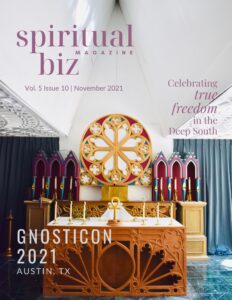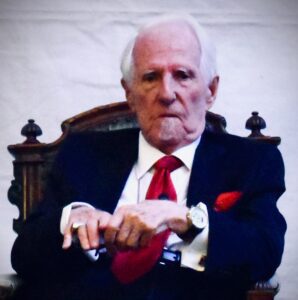by Zane Wheeler and Daniel Pape
 In the strange era in which we currently find ourselves, even a short 3-hour plane ride can seem like a hero’s journey. At least that’s what we told ourselves as we entertained traveling to Austin, Texas this past September. We had an unmissable opportunity to attend this year’s Gnosticon, a convention celebrating everything Gnostic. Daniel’s dear friend, Bishop Stephan A. Hoeller would be giving a keynote address at the convention and both of us knew it would be the perfect opportunity for Zane to finally meet the renowned scholar and hear him speak in person. The theme of this Gnosticon – the first in over 20 years – Gnosis in a Time of Upheaval. A title rife with truth.
In the strange era in which we currently find ourselves, even a short 3-hour plane ride can seem like a hero’s journey. At least that’s what we told ourselves as we entertained traveling to Austin, Texas this past September. We had an unmissable opportunity to attend this year’s Gnosticon, a convention celebrating everything Gnostic. Daniel’s dear friend, Bishop Stephan A. Hoeller would be giving a keynote address at the convention and both of us knew it would be the perfect opportunity for Zane to finally meet the renowned scholar and hear him speak in person. The theme of this Gnosticon – the first in over 20 years – Gnosis in a Time of Upheaval. A title rife with truth.
While research for our upcoming book, The Individuated Ego and the Path to True Wealth, has us dedicated to exploring the archetypes within the human psyche, it is Gnosticism that continually reemerges and provides the compass upon which our work so steadily relies. As two inquisitive writers, Gnosticon 2021 was an event we simply couldn’t refuse, and thus in the eleventh hour, we booked our flights and embarked upon our hero’s journey.
For those unaware, Gnosticism is both an ancient cultural motif, celebrated by thousands of initiates as far back as before the time of Christ, as well as a solemn act of communing with the divinity inherent in the human soul. This movement recognizes the autonomy of the human spirit and highlights one’s ability to personally connect with that which fuels the wisdom of his soul: Gnosis – Greek for knowledge. Think of the early Gnostics as intuitive pioneers on a passionate quest to reunite with their divine origin. Groups such as the Essenes, with whom Christ was said to have been affiliated, espoused unique mythology consisting of a lost goddess, Sophia, who imbued herself in the fabric of physical reality as a way to not only feminize but to beautify the otherwise bleak earthly confines authored by an unconscious, and somewhat sinister Creator deity. Obviously, this cosmology, along with the empowerment of the feminine, and the very act of Gnosis itself, a type of auto-catechism, was seen as threatening to the budding Christian religion of the time. And thus, in an attempt to negate the Gnostic movement, organized Christian leaders portrayed the Gnostics as heretics for many of their mythological beliefs, but specifically for glorifying the mystical aspects of Christ.
Luckily, with the creation of Spiritualist movements of the 19th century, mysticism and human intuition was once again resurrected; but this time it was celebrated in a more mainstream fashion and with greater fanfare. This welcoming approach to the mystical aspect of spirituality was refreshing, and along with yogic practices brought from the Far East at the turn of the century as well as a growing interest in what would come to be known as Depth Psychology, a strong foundation was being set for a powerful resurgence of the Gnostic spiritual practice.

With the discovery of the Nag Hamadi library and the Dead Sea Scrolls beginning in 1945 – which contained apocryphal writings, purportedly omitted from the Bible due to their Gnostic overtones – new emphasis was placed on Gnosis. It was as though this ancient religion, buried and somewhat forgotten, had risen like a phoenix from the ashes, becoming magically reconstituted, sparking a new awakening of the holy, mythological practice.
Enter famed Swiss psychoanalyst Dr. C.G. Jung, who had, since the turn of the century, worked diligently to understand the nature of the human soul. He equated the soul with the psyche, a symbolic uroboric womb that births all human experience, not to mention a place where our thoughts, emotions, intuitive insights, and behaviors are governed. Jung felt a kinship with the Gnostics for several reasons, but primarily because of their ardent search for the deeper meaning of existence, combined with their intuitive knowledge of symbolic language. Dr. Jung went on to conceptualize and develop a process he called Individuation – a psychic wholeness that manifests by way of integrating and unifying the polarities within the human soul; something that Gnostics devote their lives to accomplishing. Aided by the deeply insightful research of Jung, Hungarian author and Gnostic Bishop Stephan A. Hoeller set out to continue the work of celebrating and further developing man’s capacity for Gnosis by adding sacramental participation to the process. Now, the holy rites of Gnosticism could be openly practiced in a sacred setting amongst a like-minded ecclesia or congregation; something that had been suppressed for centuries.
Gnosticon celebrated this powerful revival in the midst of a magnificent landscape. The location, a charming two-story farmhouse in rural Texas, just north of Austin, sprawled out upon a bed of lovely, well-kept grass, populated by a sparse collection of beautiful ancient oak trees. The entire property bordered a charming fishing creek. It was an idyllic picture of the south, humid and steamy, cicadas buzzing, and lightning bugs blinking in the heat of the night. The home, owned by Gnostic Reverend Peter Reardon, featured a literal museum of iconography; mostly early Christian and alchemical.
 Spending a weekend perusing the artifacts in Reverend Reardon’s exquisite home, we barely scratched the surface in terms of the breadth of its majesty. There was no denying that the tranquility of the atmosphere, which included live music with beautiful vocals and white peacocks roaming in the garden, invited the Holy Spirit to descend upon all in attendance and unite both new and old members of the Gnostic community.
Spending a weekend perusing the artifacts in Reverend Reardon’s exquisite home, we barely scratched the surface in terms of the breadth of its majesty. There was no denying that the tranquility of the atmosphere, which included live music with beautiful vocals and white peacocks roaming in the garden, invited the Holy Spirit to descend upon all in attendance and unite both new and old members of the Gnostic community.
Included in Rev. Reardon’s collection were incredible suits of armor from around the world, triptychs of holy scenes, an inner sanctum lined with mirrors with a large woodcutting of the Kabbalist Tree of Life displayed hanging from the ceiling with spotlights illuminating the Sephirah. On the second floor was the Marrakesh Room with beautiful wall and ceiling hangings, punctuated by a large hookah in the center of the room, with ample floor cushions surrounding it. Recent construction to the exterior of the house revealed a holy Gnostic adytum – a chapel wherein weekly Gnostic Mass would take place. This was the home of Ecclesia Gnostica…Round Rock, Texas’s contribution to the Gnostic sacramental movement.
One of the most insightful moments at Gnosticon was the homily that Bishop Steven Marshall delivered on the concept of “Truth”, titled, “Truth That Makes Free.” This particular homily inspired all in attendance, not only because it alluded to the passage in the Gospel of John, Ye shall know the truth, and the truth shall set you free, but also because it shed light on the Gnostic myth that inner knowledge is indeed the deliverer of true freedom. Of all the lectures delivered, however, it was Bishop Stephan A. Hoeller’s message that we found the most inspiring. He not only talked about Gnostic mythology, but more importantly, he gently reminded us that Gnosis has a transcendent quality; a divine dynamic that provides all sincere seekers with access to a reservoir of insight. This reservoir is transcendent precisely because it goes beyond both factual and scientific data; it taps into symbolic, Universal knowledge, and thus, by definition, it exists beyond the boundaries of time and space.
 During a private conversation, Bishop Hoeller provided us with greater clarity when he said, “Theoretically, gnosis reveals subtle elements and powers that relate to what we call consciousness. It is to be understood, however, that the way such insights come to people is for the most part in symbolic and mythic terms. The insight that is disclosed is not of a factual nature. We might say it’s not even of an intellectual categorical nature or an emotional nature, but something else. That something else, in order to be assimilated by the individual, is usually put into mythic and symbolic form. It’s really the individual psychology that translates and processes the experience in such a way that it comes to us in the form of myth and symbol.”
During a private conversation, Bishop Hoeller provided us with greater clarity when he said, “Theoretically, gnosis reveals subtle elements and powers that relate to what we call consciousness. It is to be understood, however, that the way such insights come to people is for the most part in symbolic and mythic terms. The insight that is disclosed is not of a factual nature. We might say it’s not even of an intellectual categorical nature or an emotional nature, but something else. That something else, in order to be assimilated by the individual, is usually put into mythic and symbolic form. It’s really the individual psychology that translates and processes the experience in such a way that it comes to us in the form of myth and symbol.”
Fortunately, in comparatively recent times, we have a number of very insightful mythologists, people like Mircea Eliade, Joseph Campbell, and many others who have disclosed and stated very authoritatively that rather than being an untrue fable, a myth is really a profound disclosure from the deeper levels of human cognition. Interestingly enough, Gnosis has the immense benefit that it is tailor-made for the occasion because it comes out of your Gnosis, not somebody else’s. Not the Gnosis of the houses of congress who pass the laws. It’s yours. It’s made for the specific situations in your life, allowing you to properly discern the right path.
In essence, Gnosis is an infallible guide that speaks to us on the most personal of levels; the soul level. The Gnostics have always understood that humanity’s essence is of a divine nature, and thus, by opening our hearts and souls to Gnosis we become capable of fanning our divine spark into an eternal flame. Perhaps it’s time for the rest of humanity to recall their divine origin and recognize the deeper symbolic meaning of life.

No doubt, the weekend spent at Gnosticon expanded our awareness and brought us one step closer to understanding the depths of the human psyche and the divine spark that exist within it. However, the most important information gleaned from Gnosticon was the positive emphasis that a gnostic ceremony can have on the individual. The Gnostic Mass reminds us to take responsibility for our connection to Holy Spirit within us.
In the final analysis, we see that the attributes of courage, honesty, and humility are replete throughout the Gnostic mythos, revealing that we are all destined to be heroic. However, mythologically speaking, the hero must be willing to bravely accept their path and walk it humbly. Courageously, they must face their shadow while simultaneously honoring the forces that guide them along the way—forces that invariably communicate intuitively. Therefore, their Gnostic mechanism must be tuned to allow for this influence. Let this writing be a gentle reminder that the holy adytum within your heart, the conveyor of divine wisdom, needs regular and sincere attention.
How will you worship your indwelling divinity today? Through your actions, words, or thoughts? Perhaps you will devote your entire being to Gnosis, and by doing so live a life filled with purposeful meaning, rather than merely existing through a life filled with meaningless suffering. Thankfully, YOU get to make that CHOICE!
AUTHORS:
 Daniel Pape is an international mindset coach, author, and spiritual entrepreneur. His journey began at the young age of 17, when a reckless decision brought him face to face with death, destruction, and darkness.
Daniel Pape is an international mindset coach, author, and spiritual entrepreneur. His journey began at the young age of 17, when a reckless decision brought him face to face with death, destruction, and darkness.
Determined to uncover the deeper meaning behind life’s tragedies he embarked upon a hermetical journey where he studied the ancient art of alchemy and ultimately learned to create order out of chaos.
Along with his wife, Kimberly Maska Pape, they created Spiritual Biz Bootcamp; a prosperous mentorship program that helps their clients to create a 6-figure, online business platform. Mentoring their clients and teaching them how to use their esoteric knowledge to serve others at the highest level is what it’s all about.
Always one to break barriers, Daniel uses his eclectic knowledge to teach others how to integrate their shadow, transcend limiting beliefs, and develop the courage to use every experience as an asset for growth. You can reach out to Daniel at dp@danielpapemindset.com and www.facebook.com/danny.pape.9.

Zane Wheeler is a highly driven spiritual coach and proud graduate of Spiritual Biz Bootcamp. As a clinical hypnotherapist, his thriving practice has helped hundreds transmute their trauma into profound healing. He leads a robust online course community, guiding advanced empaths to harness their spiritual prowess.
Zane’s success affords him an abundance of time with his loving family and on his passionate pursuits of music and writing. He has published many popular articles on metaphysics and is currently co-authoring a book with SBM’s own Daniel Pape.
As a member of the Spiritual Biz 100k Club, Zane credits much of his success to the laser-focused guidance of the Bootcamp program and is grateful to have taken the leap to join. You can find Zane on www.goldenroadalchemy.com


